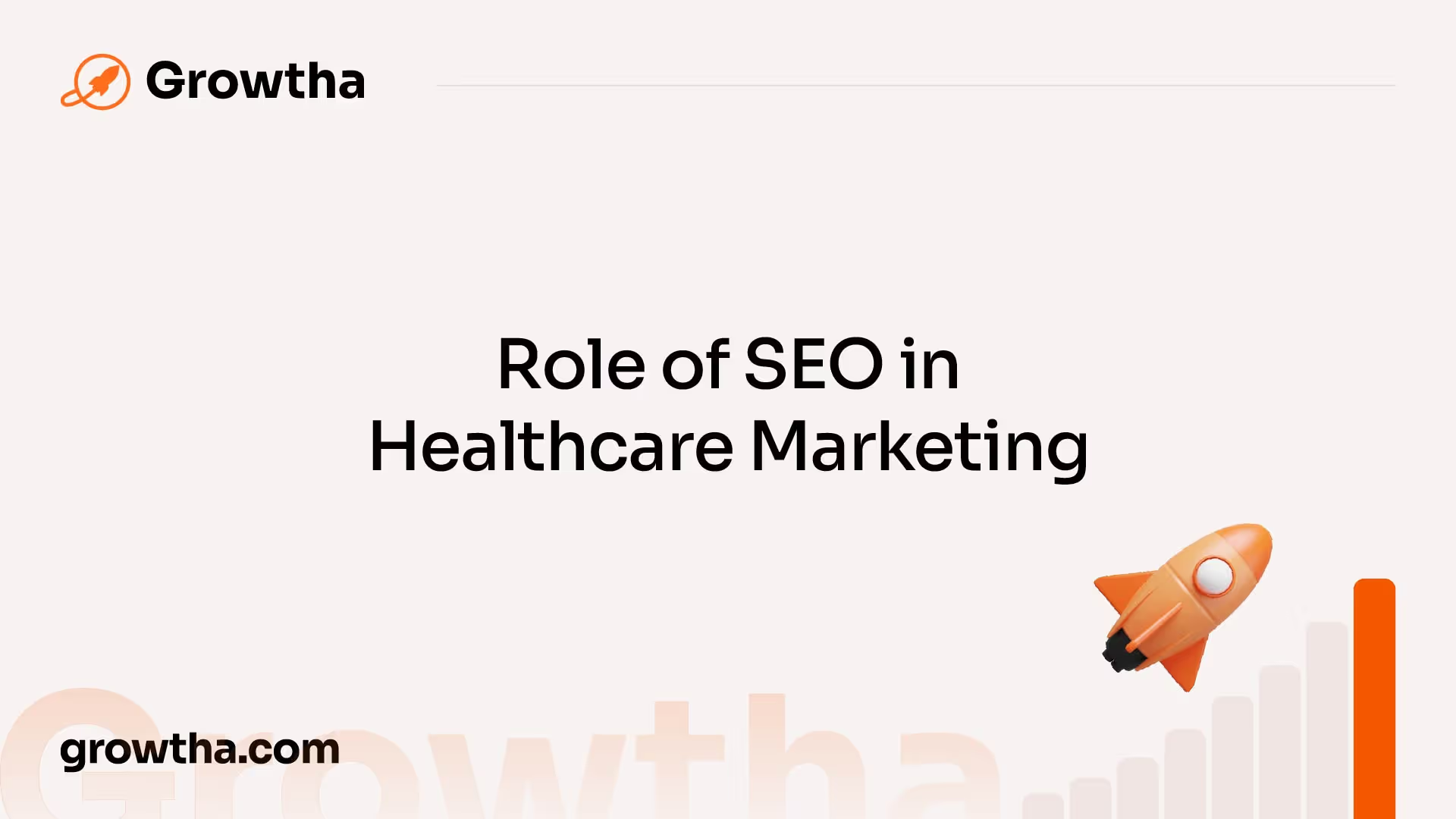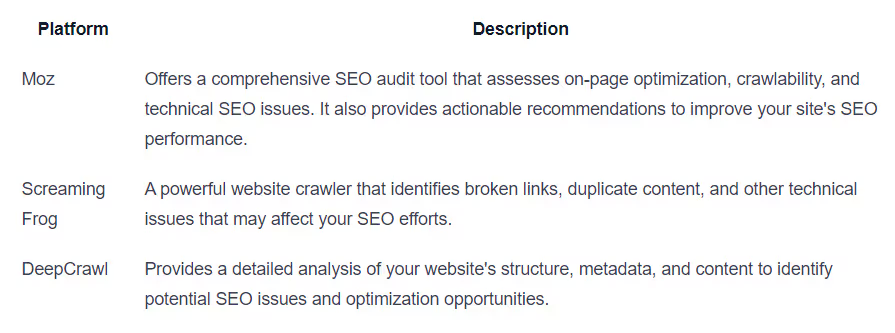Healthcare SEO for Empowering Patients
The prevalence of online medical research has seen a significant increase in recent years.


Healthcare SEO for Empowering Patients
Importance of Healthcare SEO
In the digital age, healthcare organizations need to recognize the importance of search engine optimization (SEO) to effectively reach and educate patients. This section explores the growing trend of online medical research and the impact of SEO on healthcare organizations.

Growing Trend of Online Medical Research
The prevalence of online medical research has seen a significant increase in recent years. According to Big Sea, almost 59% of US adults used the internet to look up health or medical information in the second half of 2022. Additionally, approximately 42% used it to directly communicate with a doctor during the same period. This trend is expected to continue growing as patients increasingly rely on search engines to find health information, research symptoms, read reviews of medical professionals, and choose healthcare facilities.
To effectively engage with patients and provide them with valuable information, healthcare organizations must optimize their online presence through effective SEO strategies.
Impact of SEO on Healthcare Organizations
The impact of SEO on healthcare organizations cannot be overstated. With Google receiving one billion health-related searches every day, amounting to 700,000 searches per minute (Anchor Digital), it is crucial for healthcare providers to establish a strong online presence.
Implementing SEO strategies allows healthcare organizations to be visible to patients who are actively seeking information, treatment options, or healthcare providers. By optimizing their websites and content for relevant keywords and search terms, healthcare organizations can increase their chances of appearing higher in search engine results pages (SERPs). This visibility can lead to increased website traffic, patient inquiries, and ultimately, patient conversions.
Furthermore, a strong healthcare SEO strategy enables organizations to establish credibility with search engines. By demonstrating expertise, authoritativeness, and trustworthiness (E-A-T) through high-quality content, reputable sources, and positive user experiences, healthcare organizations can improve their search engine rankings and build a trustworthy reputation online.
In an era where 80% of patients in the U.S. source their chosen healthcare provider through the internet (LinkedIn), healthcare organizations must prioritize SEO to remain competitive and relevant in the digital landscape. By understanding the core components of SEO and implementing effective strategies, healthcare organizations can harness the potential of healthcare SEO to empower patients and provide them with valuable information and resources.

Elements of Effective Healthcare SEO
To maximize the impact of healthcare SEO and empower patients with accurate and reliable information, it's essential to focus on three key elements: Expertise, Authoritativeness, and Trustworthiness (E-A-T), clear and informative content, and regular content updates.
Expertise, Authoritativeness, Trustworthiness (E-A-T)
Establishing expertise, authoritativeness, and trustworthiness is vital in healthcare SEO. Search engines prioritize websites that demonstrate these qualities, as they want to ensure that users receive reliable and accurate information. Healthcare organizations should showcase their expertise by providing valuable and trustworthy content that reflects their knowledge and experience.
Mayo Clinic, for example, has implemented an outstanding SEO strategy that captures traffic from individuals seeking reliable healthcare insights [2]. By emphasizing their strengths as a highly trusted source of medical information, research, and care, Mayo Clinic has positioned itself as a go-to resource for patients in need.
Planned Parenthood also focuses on trustworthiness as a healthcare provider and a source of information on sexual and reproductive health. They emphasize educational content and easy appointment booking to communicate to users that they can trust the organization for reliable information and services [2].
To improve E-A-T, healthcare websites should prioritize creating informative and responsible content. This positively impacts SEO rankings and enhances the overall credibility of the organization [1]. By providing accurate and reliable information, healthcare organizations establish themselves as dependable sources of knowledge, building trust with their audience.
Clear and Informative Content
Clear and informative content is crucial for healthcare SEO. Websites should aim to provide valuable information that is easy to understand and relevant to their target audience. The content should be free from complex medical jargon, allowing patients to comprehend and engage with the material effectively.
By offering content that avoids giving personal medical advice but still provides valuable insights, healthcare websites can enhance user engagement and prevent penalties for providing misleading information [1]. Users appreciate clear and concise content that educates them about their health concerns, treatment options, and preventive measures.
Regular Content Updates
Regularly updating content on healthcare websites is essential for maintaining relevance and maximizing SEO efforts. Search engines favor websites that consistently provide fresh and up-to-date information. By regularly publishing new content, healthcare organizations can attract more organic traffic and establish relationships with current and potential patients.
Keeping content updated also demonstrates a commitment to staying current with medical advancements and best practices. This reinforces the organization's authority and reliability, further enhancing the overall SEO strategy.
In summary, effective healthcare SEO requires prioritizing expertise, authoritativeness, and trustworthiness (E-A-T), creating clear and informative content, and ensuring regular content updates. By focusing on these elements, healthcare organizations can optimize their online presence, engage patients, and provide them with the valuable information they need to make informed decisions about their health.

Challenges in Healthcare SEO
While healthcare SEO can be a powerful tool for patient education and engagement, it also comes with its own set of challenges. In this section, we will explore three key challenges faced in healthcare SEO: complex medical jargon, privacy and compliance issues, and building patient trust.
Complex Medical Jargon
One of the biggest hurdles in healthcare SEO is the presence of complex medical jargon. The healthcare industry is filled with terminology that may be baffling to the average person. This poses a challenge in creating content that educates, informs, and connects without sounding like a medical textbook [3].
To overcome this challenge, healthcare SEO professionals need to strike a balance between providing accurate medical information and using language that is accessible to a wider audience. Using plain language and explaining medical terms in a clear and concise manner can help bridge the gap between medical professionals and patients. It's important to ensure that the content is easily understood by the target audience, enabling them to make informed decisions about their healthcare.
Privacy and Compliance Issues
Privacy and compliance issues pose another significant challenge in healthcare SEO. The healthcare industry must adhere to strict regulations to protect patient privacy and comply with laws such as the Health Insurance Portability and Accountability Act (HIPAA) [4]. This presents a unique challenge in balancing effective marketing strategies with the need to respect patient privacy and comply with legal requirements.
Healthcare SEO professionals must navigate these challenges by ensuring that their strategies align with HIPAA regulations. They need to be cautious when using and sharing patient data, ensuring that explicit consent is obtained before utilizing any personal information for marketing purposes. By adopting a privacy-first approach, healthcare organizations can build trust with their patients and maintain compliance with industry regulations.
Building Patient Trust
Patient trust is paramount in healthcare, and healthcare SEO plays a crucial role in building and maintaining that trust. In a world where trust is often a scarce commodity, it is essential to ensure that the online presence of healthcare organizations exudes confidence, empathy, and reliability.
To address this challenge, healthcare SEO strategies should focus on creating a user-friendly and informative online experience. This includes providing accurate and reliable information, showcasing expertise, and engaging with patients through various channels. By consistently delivering valuable content, addressing patient concerns, and actively listening to feedback, healthcare organizations can establish and strengthen patient trust.
Navigating the challenges of complex medical jargon, privacy and compliance issues, and building patient trust requires a strategic and patient-centric approach to healthcare SEO. By addressing these challenges head-on, healthcare organizations can optimize their online presence, enhance patient education, and foster meaningful connections with their audience.

Strategies for Successful Healthcare SEO
To harness the potential of healthcare SEO and effectively empower patients, healthcare organizations need to implement targeted strategies. Here are three key strategies for successful healthcare SEO: local SEO optimization, high-quality educational content, and ongoing SEO efforts.
Local SEO Optimization
Local SEO optimization is crucial for healthcare providers, as most patients prefer seeking treatment close to their home, work, or school. By focusing on improving visibility in location-oriented search results, healthcare organizations can reach their target audience more effectively. Managing Google My Business profiles is an essential aspect of local SEO optimization, as it significantly enhances a practice's visibility in local search results [5].
To optimize local SEO, healthcare organizations should ensure that their contact information, including name, address, and phone number (NAP), is consistent and up to date across all online platforms. This consistency helps search engines understand the location and credibility of the healthcare practice. Additionally, obtaining positive reviews from satisfied patients can boost local rankings and build trust among potential patients.
High-Quality Educational Content
Crafting high-quality, educational content that addresses common patient questions or concerns is a powerful strategy for improving healthcare SEO. Providing valuable information not only enhances credibility but also positively impacts a medical website's search engine ranking. By creating content that educates and engages patients, healthcare organizations can establish themselves as trusted sources of information [5].
When developing educational content, healthcare organizations should focus on addressing the specific needs and interests of their target audience. This includes providing information about common medical conditions, treatment options, preventive care, and lifestyle recommendations. Incorporating relevant keywords related to patient education in the content can further enhance its visibility in search engine results pages (SERPs).
Ongoing SEO Efforts
Healthcare SEO is not a one-time project but an ongoing effort that requires regular updates and adaptability. Search engine algorithms constantly evolve, and healthcare organizations must stay updated to maintain their online presence and visibility. While it may take 6-12 months to see noticeable results, consistent and persistent SEO efforts yield long-term benefits.
To ensure ongoing SEO success, healthcare organizations should regularly monitor their website's performance, analyze relevant keywords, and make necessary adjustments to optimize content. Staying informed about industry trends and updates in search engine algorithms is also crucial. Collaborating with SEO professionals can provide valuable expertise and guidance in implementing effective SEO strategies.
By implementing local SEO optimization, creating high-quality educational content, and maintaining ongoing SEO efforts, healthcare organizations can enhance their online visibility, establish credibility with search engines, and ultimately empower patients with accurate and valuable healthcare information.

Role of SEO in Healthcare Marketing
In the realm of healthcare marketing, SEO plays a critical role in establishing credibility, adhering to industry regulations, and setting healthcare practices apart from the competition.
Establishing Credibility with Search Engines
Effective healthcare SEO involves aligning content, keywords, and user experience to improve the chances of ranking higher in search results. This is especially important in the healthcare industry due to its unique sensitivities, regulations, and audience needs [6]. When healthcare websites rank higher in search results, they are perceived as more credible and authoritative. This reinforces the expertise and reputation of healthcare providers, increasing the likelihood of patients choosing their services.
By implementing effective SEO strategies, healthcare organizations can optimize their online presence, ensuring that their website appears in relevant search queries. This visibility not only enhances the credibility of the practice but also increases the chances of attracting new patients.
Adhering to Industry Regulations
The healthcare industry is governed by strict regulations to protect patient privacy and ensure ethical practices. When implementing SEO strategies, healthcare organizations must navigate these regulations to maintain compliance. This includes following guidelines such as the Health Insurance Portability and Accountability Act (HIPAA) and other industry-specific regulations.
By incorporating SEO tactics that adhere to these regulations, healthcare organizations can build trust with patients. This involves being transparent about data privacy, ensuring secure online forms, and providing accurate and up-to-date medical information. Adhering to industry regulations in SEO practices demonstrates a commitment to patient care and professionalism.
Setting Healthcare Practices Apart
In a competitive healthcare landscape, it's crucial for practices to differentiate themselves from others. SEO can help healthcare organizations stand out by effectively targeting their desired audience and showcasing their unique services and expertise.
One strategy for setting healthcare practices apart is through local SEO optimization. Since most patients prefer seeking treatment close to home, work, or school, focusing on local search results is paramount. Managing Google My Business profiles, optimizing location-specific keywords, and ensuring accurate contact information can significantly enhance a practice's visibility in local search results [5].
Crafting high-quality, educational content that addresses common patient questions or concerns is another effective SEO strategy. By providing valuable information and insights, healthcare organizations can enhance their credibility and positively impact their SEO rankings. Educational content not only attracts potential patients but also establishes the practice as a reliable source of information [5].
By leveraging SEO strategies to establish credibility, adhere to industry regulations, and set themselves apart, healthcare organizations can effectively market their services and attract the right patients. SEO is a powerful tool that can drive traffic, enhance visibility, and contribute to the long-term success of healthcare marketing efforts.
Tools and Resources for Healthcare SEO
When it comes to implementing a successful healthcare SEO strategy, utilizing the right tools and resources can greatly enhance your efforts. In this section, we will explore some essential tools and platforms that can help streamline your healthcare SEO strategy and improve your online presence.
Reporting and Keyword Research Tools
Reporting and keyword research tools play a vital role in healthcare SEO. These tools provide valuable insights into website performance, keyword rankings, and competitor analysis. By leveraging these tools, you can make data-driven decisions to optimize your website and content.
Some popular reporting and keyword research tools include:

These tools provide valuable data that can help you identify opportunities, track your progress, and optimize your healthcare SEO strategy.
SEO Audit Platforms
SEO audit platforms help evaluate the overall health and performance of your website. These platforms analyze various aspects of your site, including site structure, page speed, mobile-friendliness, and technical SEO issues. By identifying and resolving these issues, you can improve your website's visibility and user experience.
Some popular SEO audit platforms include:

By utilizing these SEO audit platforms, you can uncover areas for improvement and ensure that your website is optimized for search engines.
Streamlining SEO Strategy
In the ever-evolving landscape of healthcare SEO, it's important to stay updated with the best practices and industry trends. Streamlining your SEO strategy involves keeping abreast of the latest algorithm changes, identifying new keywords and search trends, and continuously optimizing your content.
To streamline your healthcare SEO strategy, consider the following resources:
- Industry blogs and forums: Stay informed about the latest trends, algorithm updates, and best practices by following reputable healthcare SEO blogs and participating in industry forums.
- Webmaster tools: Utilize tools such as Google Search Console and Bing Webmaster Tools to monitor your website's performance, identify indexing issues, and receive important notifications from search engines.
- Continuing education: Attend webinars, workshops, and conferences focused on healthcare SEO to gain insights from industry experts and further enhance your knowledge.
By staying proactive and leveraging these tools and resources, you can optimize your healthcare website for better search engine visibility, reach a wider audience, and empower patients with valuable information and resources.
Remember, healthcare SEO is an ongoing process that requires regular monitoring and adjustments. By continuously evaluating your performance, refining your strategies, and staying up-to-date with the latest SEO trends, you can effectively navigate the competitive healthcare landscape and drive more organic traffic to your website.
References
[1]: https://blog.tbhcreative.com/seo-for-healthcare-websites/
[2]: https://bigsea.co/ideas/healthcare-website-design/
[3]: https://www.linkedin.com/pulse/what-common-seo-challenges-healthcare-often-meet-saikat-mazumder-ro8fc?trk=article-ssr-frontend-pulsemore-articlesrelated-content-card
[4]: https://www.weareamnet.com/blog/healthcare-marketing-challenges/
[5]: https://www.ihealthspot.com/blog/healthcare-seo-guide-to-medical-search-engine-optimization/
[6]: https://anchordigital.com.au/articles/why-seo-for-the-healthcare-industry-is-important







